The Missing Person
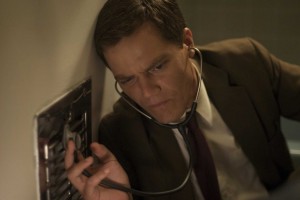 It’s a shame that Hollywood is only interested in making origin films for the heroes of comic book films. Such is the case with the recent X-Men Origins: Wolverine. Frankly, the heroes tend to be dull. And so, while there are some aberrations—such as with Lexi Alexander’s campy, silly, and ridiculously entertaining and colorful Punisher: War Zone, which gave us an anti-hero to enjoy as he engaged in as much gratuitous carnage as possible—it still contains an element of self-righteousness because Frank Castle believes he’s doing the “right” thing. What would be preferable is if there were a protagonist as proudly disreputable as Watchmen’s Rorschach, but as a lead instead of as a supporting player.
It’s a shame that Hollywood is only interested in making origin films for the heroes of comic book films. Such is the case with the recent X-Men Origins: Wolverine. Frankly, the heroes tend to be dull. And so, while there are some aberrations—such as with Lexi Alexander’s campy, silly, and ridiculously entertaining and colorful Punisher: War Zone, which gave us an anti-hero to enjoy as he engaged in as much gratuitous carnage as possible—it still contains an element of self-righteousness because Frank Castle believes he’s doing the “right” thing. What would be preferable is if there were a protagonist as proudly disreputable as Watchmen’s Rorschach, but as a lead instead of as a supporting player.
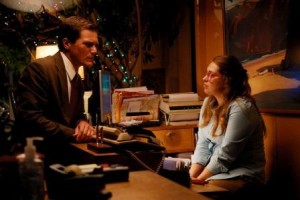 A more ambitious idea would be to take the various villains from Dick Tracy, surely more interesting than the straight-laced bore of the title character, and make a movie from their perspective. Noah Buschel’s The Missing Person plays like someone finally decided to do that. Its lead character, private investigator John Rosow, as played by Michael Shannon, is made up to look like a depressed and hung over mash-up of Dick Tracy enemies’ Flat-Top and Influence, using the cadence and indecipherable speech patterns of Mumbles. And while The Missing Person isn’t a superhero movie—it’s somewhere between film noir and neo noir (it’s a modern film, but Rosow has very little knowledge of current technology)—it’s preferable to find this conglomerate character in a hazy mystery plot as opposed to trying to take over the world.
A more ambitious idea would be to take the various villains from Dick Tracy, surely more interesting than the straight-laced bore of the title character, and make a movie from their perspective. Noah Buschel’s The Missing Person plays like someone finally decided to do that. Its lead character, private investigator John Rosow, as played by Michael Shannon, is made up to look like a depressed and hung over mash-up of Dick Tracy enemies’ Flat-Top and Influence, using the cadence and indecipherable speech patterns of Mumbles. And while The Missing Person isn’t a superhero movie—it’s somewhere between film noir and neo noir (it’s a modern film, but Rosow has very little knowledge of current technology)—it’s preferable to find this conglomerate character in a hazy mystery plot as opposed to trying to take over the world.
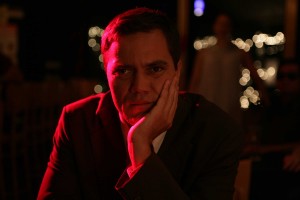 Thankfully, Buschel doesn’t drench The Missing Person in in-jokes and self-awareness; just moody lighting and genre appropriate voiceover. In fact, The Missing Person, which diverges in a number of unpredictable directions, is one of the very few noirs to justify its voiceover as more than a cheat and a framing device. It’s actually emotionally necessary to the story. Usually, narration in a noir is supposed to guide us through the confusion that the main character is suffering through, providing the back story that the screenwriter was too lazy to fill in for us. But Buschel keeps us in the dark about Rosow’s past (though it is eventually divulged in clunky third act scene of exposition*) and Rosow’s given so little information about the case he’s hired for that his discoveries arrive like begrudging realizations. Shannon plays Rosow like a thirsty lizard who is barely aware of his surroundings and unable to lie well enough to be good at his job. He thinks he’s following a pedophile that kidnaps children and takes them to Mexico. But his burnt out cliché of a persona is so harmless that even when he’s caught by a murderous drug dealer, he’s released with little more than a scratch.
Thankfully, Buschel doesn’t drench The Missing Person in in-jokes and self-awareness; just moody lighting and genre appropriate voiceover. In fact, The Missing Person, which diverges in a number of unpredictable directions, is one of the very few noirs to justify its voiceover as more than a cheat and a framing device. It’s actually emotionally necessary to the story. Usually, narration in a noir is supposed to guide us through the confusion that the main character is suffering through, providing the back story that the screenwriter was too lazy to fill in for us. But Buschel keeps us in the dark about Rosow’s past (though it is eventually divulged in clunky third act scene of exposition*) and Rosow’s given so little information about the case he’s hired for that his discoveries arrive like begrudging realizations. Shannon plays Rosow like a thirsty lizard who is barely aware of his surroundings and unable to lie well enough to be good at his job. He thinks he’s following a pedophile that kidnaps children and takes them to Mexico. But his burnt out cliché of a persona is so harmless that even when he’s caught by a murderous drug dealer, he’s released with little more than a scratch.
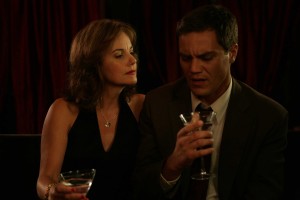 Shannon’s performance is so complete, he moves like The Elephant Man and enunciates like Mickey Rourke, that Buschel hardly has to fill in the periphery characters and their bemusement at the mere existence of Rosow. Character actors like Amy Ryan (who co-produced), Daniel Franzese, and John Ventimiglia drop in for an amusing scene and linger in the memory simply because they represent how we might respond to Rosow. Rosow’s an eyesore, and when he flirts with lines like “I’m in the hide and seek business,” it’s perfectly believable that he wouldn’t know he’s being conned by a cell phone salesman or that glow-in-the-dark sunglasses won’t work too well at night**.
Shannon’s performance is so complete, he moves like The Elephant Man and enunciates like Mickey Rourke, that Buschel hardly has to fill in the periphery characters and their bemusement at the mere existence of Rosow. Character actors like Amy Ryan (who co-produced), Daniel Franzese, and John Ventimiglia drop in for an amusing scene and linger in the memory simply because they represent how we might respond to Rosow. Rosow’s an eyesore, and when he flirts with lines like “I’m in the hide and seek business,” it’s perfectly believable that he wouldn’t know he’s being conned by a cell phone salesman or that glow-in-the-dark sunglasses won’t work too well at night**.
Rosow’s bumbling, which verges on slapstick but thankfully never quite gets there, allows Buschel to play with the tone. Buschel drifts into David Lynch territory (especially Ryan Samul’s striking, morose cinematography) without getting drowned in it. Buschel engages in various surrealist elements and fantasy scenes, but avoids Lynch’s tendency to explore the duality of hipster suburbanites, where oldies and irony shop at the same mall.
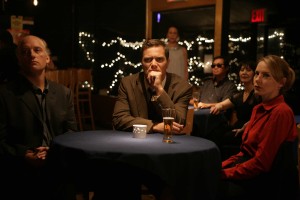 And yet with all of these floating distractions, Buschel successfully involves us emotionally, making us worry about the sadness of the circumstances instead of just the resolution***. It’s rare that a crime film is so stirring that the complexities of the conclusion are secondary to how the characters actually feel about the situation (shades of Gone Baby Gone, where Amy Ryan also had a supporting part). Such emotional attachment makes it quite a selfish wish that someone hire Shannon for the next reboot of The Punisher franchise. All he needs to do to succeed is a grumble and a gun.
And yet with all of these floating distractions, Buschel successfully involves us emotionally, making us worry about the sadness of the circumstances instead of just the resolution***. It’s rare that a crime film is so stirring that the complexities of the conclusion are secondary to how the characters actually feel about the situation (shades of Gone Baby Gone, where Amy Ryan also had a supporting part). Such emotional attachment makes it quite a selfish wish that someone hire Shannon for the next reboot of The Punisher franchise. All he needs to do to succeed is a grumble and a gun.
* We even get a variation on the “Forget it, Jake. It’s Chinatown” line, but it suggests a lot more trouble than Buschel is able to pay off about Rosow’s past.
** The sunglasses allow for a great variation on the condom joke in Blake Edwards’ Skin Deep.
*** Which will remind some theatergoers of the central situation of Neil Labute’s The Mercy Seat.



